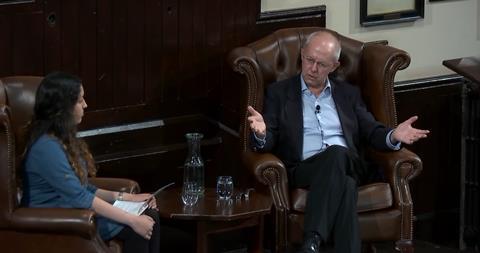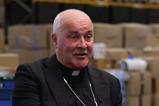Justin Welby has once again waded into the Church of England’s debate on same-sex relationships, now claiming his previous views were due to him being “a bit thick”. Rev Ian Paul says Welby has left the CofE more divided than ever

The former Archbishop of Canterbury, Justin Welby, is back in the headlines again, this time following comments he recently made at the Cambridge Union.
When I heard about this, I could not help rolling my eyes. Despite having initially welcomed his appointment, and having then tried hard to work with him as a member of the Archbishops’ Council, I sadly came to the conclusion that as archbishop he has done immense damage to the Church of England—damage that it is going to take a decade (or in some instances a generation) to undo (see my reasoning here).
Given the circumstances of his resignation (and later comments in the Lords), I can’t help but wonder when Justin will actually get the message that what we now need from him is dignified silence?
As one person commented on the YouTube video: “I find it extraordinary that some of the brightest minds in the Land are taking counsel from an individual that left the church in disgrace. An individual most certainly part of the problem and not the solution in my opinion. Why does Welby continue to have a public profile when his failure to respond left so much destruction behind?”
The particular comments that hit the headlines were, once again, about the questions of marriage and sexuality. Despite them only occupying three-and-a-half minutes, Justin manages to illustrate everything that has gone wrong in this debate—and all the problems with his own leadership. Here’s what he said:
1. “I said in September, I believed it was proper to have standalone services of blessing in churches for same-sex couples.”
The opening problem comes in the first word: ‘I’.
Justin speaks as though his opinion carries weight, quite apart from any process of discussion, theological reflection, and due process, and this reflects one of the disasters of his tenure—that he felt he could cut through complexity, and ‘fix’ our problems. He couldn’t.
But the confidence of his belief disguises the complexities and contradictions of his claims. The only way that any ‘blessing’ was agreed by Synod was on the basis that we would be blessing two individuals, and not ‘blessing’ their relationship, since the language of blessing implies divine approval—and the Church’s teaching on marriage, as between one man and one woman, is that sexual intimacy outside of that is sin and should be met pastorally with a call to repentance. All these complexities and questions Justin breezily dismisses.
And the reason that we have not agreed ‘stand alone’ blessings is that, were they to happen, they would be indistinguishable from a celebration of a marriage relationship.
2. “The use of the word marriage is much more complicated, there is a very clear biblical definition of marriage which is in the words of, in the mouth of, Jesus, clearly between a man and a woman.”
Why is this issue “complicated” if there is a “very clear biblical definition”?
To be sure, there are many complexities around the customs and expectations of marriage in different cultures—the ‘administration’ of marriage. But despite all the different contexts of marriage relationships described in scripture, there is one consistent feature: it is only ever between men and women. And scripture consistently gives a reason for this: it reflects God’s creation of humanity as male and female. That is why, in Romans 1, Paul moves so quickly from God’s revelation of himself in creation to deploy the classic Jewish rejection of same-sex relationships in any form. In fact, this was one of the most clear distinctives between Jews and non-Jews in the ancient world—a distinctive which the early Christian movement adopted wholesale.
3. “It may take some time before, if ever, before we get to marriage because the church worldwide is deeply split on this not just the Church of England.”
No, the church worldwide is not “deeply split” on this issue. The vast majority of Christians worldwide believe marriage is between a man and a woman—including the vast majority of the Anglican Communion, of which Justin was supposed to be leader. In fact, this has been the view of most people through history, since marriage leading to the begetting and raising of children has been the foundation of all cultures. Few have had the luxury of not needing offspring to care for their parents in old age, to inherit, and to pass on the family name. It is a conceit of the modern West that these things are not of central importance.
Within Christianity, this view is so well established that Darrin Snyder Belousek can say, quite justifiably: “The creational-covenant pattern of marriage…is a consensus doctrine of the church catholic. Until the present generation, all Christians everywhere have believed, and every branch of the Christian tradition has taught, that marriage is man-woman monogamy… Marriage, the whole church has always confessed, is not only a monogamous union but also a man-woman union.” (Marriage, Scripture, and the Church).
4. “Everything we see and understand in the huge amount of study we’ve done is that there are social goods in faithful lifelong stable relationships of people of the same sex being together and living in covenant relationships. I didn’t used to think that, my mind’s changed over the last 10 years.”
The approach outlined here by Justin appears to be entirely social, pragmatic, and situational. ‘Does this pattern of relationship feel nice’ sits very well in our individualised culture of affectation, where we consider a limited selection of the horizontal dimensions of ethical issues. But that is not the way Christian theology should be done, and historically has not been the way the Church of England does its theological thinking. Sadly, it is theological thinking that has been lacking from this whole process.
The key questions to ask about marriage and sexuality are: what does it mean to be bodily, created in God’s image? What does it mean to be sexed, that is, created male and female? And what are our sexed bodies for? These are questions which appear to be completely absent from Justin’s thinking.
What is really odd is that the Church of England itself does have clear answers to these questions, expressed in previous statements from the House of Bishops, and in the current Canons of the Church, which both define where doctrine comes from, and what it says. But Justin demonstrates little knowledge of them, and less commitment to them, despite having vowed to uphold them at each of his three ordinations.
5. “When [gay people] fall in love and live out that love faithfully and with stability and caring for others [sic], it is a huge blessing for them and for society and I’ve seen that in so many places, that in the end even I began to realise that I was being thick.”
Justin tucks away another incoherence in his closing comments, and then manages to airily wave away 20 centuries of Christian thinking with a simple dismissal.
If all we need is for people to live “faithfully and with stability”, why should that only be between two people? Polyamory is the next big question in the secular ethical landscape. And what does “stability” actually mean? Why would it need to be “exclusive” as long as it involves “caring for others”?
But the most extraordinary comment he makes in this brief exchange is that his own failure in the past to come to his now enlightened position is that he was “being a bit thick”. It is impossible not to infer from this comment that this is now how he views those that do not agree with him. Faithful, orthodox Anglicans, who uphold Jesus’ clear teaching that marriage is between one man and one woman, along with the vast majority of Christians in history and worldwide today, are just “a bit thick.”
For Justin, it appears, there is not a clear and consistent historic theological position from which he is, daringly, dissenting. Nor even are there two respectable theological positions in tension with one another. There are enlightened people like himself, and others, like me, who are continuing to be “a bit thick”.
And that is why the Living in Love and Faith (LLF) process in the Church of England, far from creating mutual understanding and greater discernment, has sanctioned open hostility and division. We were supposed to have “consultations” this summer on the different views, and as someone said to me this morning, in this person’s diocese: “it has revealed vehement irreconcilable division and chaos.”
Is there a way forward for the Church of England, and a way to heal the deep divisions that Justin’s approach has created? Yes—but only one. We need to rediscover what we actually believe, that according to the teaching of our Lord, marriage is between one man and one woman. And we need to regain confidence that Jesus really is the good shepherd, and that when he teaches this, he knows what he is doing, and that this teaching really is the way to life in all its fullness for everyone, regardless of their sexuality.






































7 Readers' comments